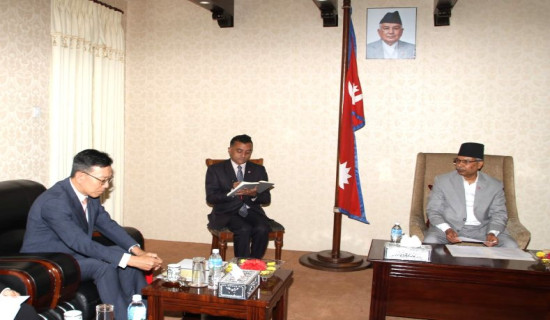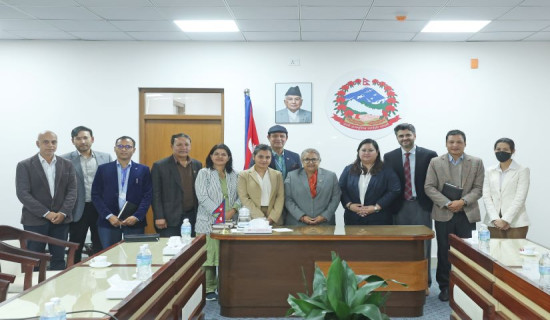- Friday, 7 November 2025
Taradevi's Bag Industry evolving into a role model of local entrepreneurship
Deepak Chand
Bhadrapur (Jhapa), Sept 23: When you arrive at Pragatitol in Buddhashanti rural municipality-3 of Jhapa, you're likely to hear a remarkable story that speaks of resilience, creativity, and transformation. It is the inspiring journey of Taradevi Adhikari, a woman whose determination turned a modest idea into a symbol of empowerment for many.
Widely admired for her gentleness, dedication, and tireless work ethic, Taradevi has become a well-known name not only in Buddhashanti but throughout the Koshi Province. She is the founder of Sheetala Bag Industry, a flourishing enterprise that is empowering women while leaving its mark in the area of local manufacturing.
Inside the ground floor of her home, Taradevi is always busy, surrounded by piles of colorful fabrics, threads, scissors, and sewing machines. What started as a modest attempt to make a living has now grown into a beacon of hope for many women striving for self-sufficiency. She is not just an entrepreneur but also a mentor and employer to women who share the dream of independence.
Her journey began over a decade ago, when she took a cutting and sewing training programme supported by the Cottage and Small Industries office. At the time, she couldn’t even afford her own sewing machine. She worked for others, saving little by little. One day, while tailoring clothes for clients, she crafted a simple bag from leftover fabric — an experiment that caught the eyes of visitors and sparked an unexpected interest. That small moment of creativity became the foundation for her now-flourishing enterprise.
In 2076 BS, Taradevi officially established Sheetala Bag Industry. Today, the industry produces a wide range of bags in various sizes, designs, and price points, ranging from Rs 50 to Rs 3,500. She sources raw materials from Kathmandu and Siliguri, India, and also incorporates local materials like Dhaka fabric and Allo plant fiber.
Currently, the industry employs 18 women full-time, while another 15 work part-time. Most of these women are the primary caregivers in their families. Through their work, they earn between Rs 20,000 and Rs 30,000 per month.
Taradevi takes pride in watching her employees grow and become financially empowered. Her products are now in demand throughout the hilly districts of Koshi Province and as far as Kanchanpur in Sudurpaschim.
Some months ago, the Bheemdatta municipality in Kanchanpur had ordered 110 bags from her industry to distribute to municipal assembly members. Taradevi and her team completed the order in just four days.
While the COVID-19 pandemic brought economic hardships globally, it had an unexpected silver lining for her business. Demand for her products surged, opening up new markets and opportunities.
In addition to this, Buddhashanti rural municipality has distributed bags manufactured in the factory to students of its community schools.
Similarly, bags produced here are also exported to Khandbari of Sankhuwasabha, Ilam, Panchthar, Taplejung, Bhojpur, among other districts.
Not only manufacturing the bags, Tara Devi is also active in imparting training to others. She imparts training to women as per the demand of local level and community organisations.
Women, after getting training, have got opportunity to manufacture bags even in low scale in their areas. Tara Devi opined, "One can be skillful from training. Skill boosts self-confidence and self-confidence helps in employment and income generation."
She has become successful to buy land at Buddhashanti-3 within few years of starting her bag industry and has constructed a three-storey house, thanks to her bag enterprise.
Tara Devi shared that she makes net income of around Rs 1.5 million annually. She makes the publicity of her production using social networking sites including Facebook, Tiktok, as well as local fair.
Shitala Bag Factory has helped women to run their family as well as make them self-dependent and strong financially.
She has a plan of creating environment for employment to women by running training at different places of the country in coming days as well as investing in new technology and design in order to make the products more attractive and qualitative.
The journey of Tara Devi, which began from a small village of Jhapa, has now become a symbol of women's self-reliance, respect of labour and success. The path shown by Tara Devi's determination and dedication has become inspiration for other women. RSS














